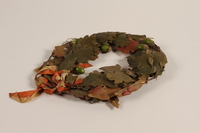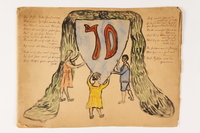Overview
- Description
- The Levi, Kronthal, and Eis family papers document the family of Sali Levi, last rabbi of the old Jewish community of Mainz, as well as the families of his wife Margarete Levi, nee Weissmann, his sister-in-law Rosa Kronthal, his son Hans Levi, and his son-in-law Max Eis. The collection contains biographical materials, correspondence, subject files, photographs, sermons, writings, speeches, and books documenting the lives of the Kronthal, Levi, and Eis families as they were forced to flee Germany and immigrate to the United States during the Holocaust.
Biographical materials date from 1867-circa 2010 and include birth, marriage, and death certificates; identification and membership cards; school records; awards; military papers; engagement and marriage announcements; immigration and naturalization records; employment records; wills; death notices and obituaries; mourning books; personal and family histories; vaccination records; and clippings.
Correspondence files date from 1918-1997 and include letters among family members, friends, and professional and social contacts. Subjects include Kristallnacht, immigration efforts, and life in Germany, Theresienstadt, Deggendorf, and America. The files include Hans Levi’s objections to the American Consul in Switzerland’s lack of attention to Rosa Kronthal’s immigration efforts, photocopies of Sali Levi’s 1933 objections to the way his son’s high school was treating Jewish students as “guests,” correspondence between Albert Eis and the wife of the man who assaulted him during Kristallnacht, and letters of thanks and praise for Rosa Kronthal from Eleanor Roosevelt, Leo Baeck, and Joachim Prinz.
Subject files date from 1934-2010 and include information about the families’ immigration efforts, the Jüdische Bezirksschule Mainz, the Jüdische Selbstverwaltung Theresienstadt, Walldorf, and restitution claims pursued by various family members for confiscated goods, taxes and fees, bank accounts, pensions, insurance policies, and lost income.
Photographs date from 1911-2000 and include family members; the synagogue, Jewish museum, and Jüdische Bezirksschule in Mainz; Rosa Kronthal's and Sali Levi's gravestones; Wilhelm and Johanna Levi's house; and photographs related to one of Max Eis' employers.
Sali Levi’s writings and speeches date from circa 1906-1941 and cover religious topics and personal experiences. They include eulogies and descriptions of old Jewish gravestones in Mainz, Jews in Russian Poland, and prayer books used by soldiers in the field during World War I.
Sali Levi’s sermons date from 1908-1941 and are accompanied by computer disks and printed draft English transcriptions of some of the sermons.
Books in the collection date from 1880-1994 and include religious and prayer books owned by Sali Levi, works on the Holocaust and Jewish communities in Germany, a prayer book belonging to Jakob Eis, and a book of sermons by Seligmann Meyer. - Date
-
inclusive:
1867-2010
- Credit Line
- United States Holocaust Memorial Museum Collection, Gift of Regina Lackner
- Collection Creator
- Levi family
- Biography
-
Rabbi Dr. Sali Levi (1883-1941) was born to Wilhelm Levi and Johanna Sternweiler Levi in Walldorf, although some sources give his birthplace as neighboring Wiesloch. He studied at the Jewish Theological Seminary in Breslau where he was appointed second rabbi at the New Synagogue. He married Margarete Weissmann in 1912. During World War I he served as an army chaplain stationed at Vilna, and he became the rabbi of Mainz in 1918. After the Nazi rise to power, he was appointed chaplain for the Osthofen concentration camp, and he served as the first principal of the Jüdische Bezirksschule Mainz, established in 1934 for the Jewish children who were increasingly unwelcome in German public schools. He died of a heart attack in Berlin in 1941 while awaiting final papers for his immigration to the United States. Sali Levi's relatives include his maternal grandfather Lippmann Sternweiler, brother and sister-in-law Josef and Berta Levi, and sister and brother-in-law Berta and Markus Slodki.
Margarete Levi (1886-1960) was born Margarete Weissmann to Simon Weissmann and Lina Wischnitz Weissmann in Kieferstädtel. She had been trained as a concert pianist. She and Rabbi Dr. Sali Levi had three children: Hilde, Hans, and Ruth. She immigrated to the United States following her husband’s death in 1941 and became an American citizen in 1947. Her relatives include her sisters Rosa and Frieda Weissmann, cousin Adolf Kober, and aunt Fanny Kober.
Hans Levi (1915-1997) was born in Breslau to Margarete and Sali Levi. He completed his high school education in Germany, pursued aviation studies in the Netherlands, and immigrated to the United States in 1936. He served with the 82nd Airborne Division during World War II, taking part in the invasions of North Africa, Sicily, Italy, Normandy, and the Netherlands, and earning a Bronze Star and a Purple Heart. After the war he pursued a career as a manufacturer and entrepreneur designing machinery, living and working in the New York/New Jersey area for over thirty years before moving to southern California in the early 1980s.
Rosa Kronthal (1878-1964) was an older sister of Margarete Weissmann Levi. She was trained as a school teacher and married Berthold Kronthal in 1918. Berthold Kronthal (1860-1942) was born in Posen and became the head of the public library system in Breslau. During World War II, both were deported to Theresienstadt, where Berthold died. Rosa spent two years in a displaced persons camp in Switzerland following the war before immigrating to the United States in 1946. She died in New York City. The Kronthals’ relatives include their nieces Annemarie Schwabacher and Liselotte Croner, nephew Willy Kronthal, and great-nephews Claes and Stefan Croner.
Max Eis (1917-1991) was born in Mainz to Jakob Eis and Regina Meyer Eis. He immigrated to the United States via England in 1938. His brother Albert, who had been assaulted during Kristallnacht, followed shortly after. His parents were deported to Theresienstadt around 1942 where his mother died in 1943. His father spent a year at the Deggendorf displaced persons camp before immigrating to the United States where he died in New York in 1952. Max Eis married Sali Levi’s daughter, Ruth Levi, in 1942, and the couple had two children, Steven Eis and Regina Eis Lackner. Max Eis’ relatives include his mother's uncle Seligmann Meyer, sister-in-law Irma Eis and her parents Sali and Amalie Edinger, and second cousin Irwin Meyer.
Physical Details
- Genre/Form
- Photographs.
- Extent
-
3 negatives.
4 diskette.
- Extent
-
6 boxes
1 oversize box
1 oversize folder
- System of Arrangement
- The Levi, Kronthal, and Eis families papers are arranged as five series: I. Sali Levi Family, 1880-2010, II. Margarete Levi Family, 1867-1960, III. Hans Levi Family, 1952-1997, IV. Berthold and Rosa Kronthal Family, 1883-1964, V. Max Eis Family, 1911-2000
Rights & Restrictions
- Conditions on Access
- There are no known restrictions on access to this material.
- Conditions on Use
- Material(s) in this collection may be protected by copyright and/or related rights. You do not require further permission from the Museum to use this material. The user is solely responsible for making a determination as to if and how the material may be used.
Keywords & Subjects
- Topical Term
- Rabbis--Germany--Mainz (Rhineland-Palatinate) Jews--Germany--History--1933-1945. Holocaust survivors. Holocaust, Jewish (1939-1945)--Reparations. Refugee camps. Jewish athletes--Germany. Jewish day schools--Germany. Librarians--Germany.
- Geographic Name
- Germany--Emigration and immigration--Government policy--20th century. Wrocław (Poland) Mainz (Rhineland-Palatinate, Germany) Walldorf (Baden-Württemberg, Germany)
- Corporate Name
- Theresienstadt (Concentration camp)
Administrative Notes
- Holder of Originals
-
United States Holocaust Memorial Museum
- Legal Status
- Permanent Collection
- Provenance
- The Levi, Kronthal, and Eis families papers were donated in 2012 by Regina Lackner.
- Funding Note
- The cataloging of this collection has been supported by a grant from the Conference on Jewish Material Claims Against Germany.
- Record last modified:
- 2023-02-24 13:41:04
- This page:
- https://collections.ushmm.org/search/catalog/irn61049
Additional Resources
Download & Licensing
In-Person Research
- Available for Research
- Plan a Research Visit
-
Request in Shapell Center Reading Room
Bowie, MD
Contact Us
Also in Max and Ruth Levi Eis family and the Kronthal family collection
The collection consists of a wreath, correspondence, documents, photographs, and publications relating to the experiences of Max Eis and his family in Mainz, Germany, before the Holocaust, in Theresienstadt labor camp-ghetto during the Holocaust, and after their respective immigrations to the United States and also to the experiences of the Levi and Kronthal families in Mainz and Breslau, Germany, before the Holocaust, in several concentration camps during the Holocaust, and after their respective immigrations to the United States.
Date: 1867-2010

Oak leaf wreath separated into sections awarded prewar to a Jewish youth for swimming across the Rhine River
Object
Oak leaf wreath with acorns, now in several pieces, awarded to Max Eis in the mid-1930’s for swimming across the Rhine River near the town of Mainz, Germany, where he lived with his parents, Jakob and Regina, and his brother, Albert. Max and Alfred participated in athletic competitions as members of the Mainz chapter of the Jewish sports club, Schild, which was associated with Reichsbund Juedischer Frontsoldaten (The Organization of Jewish Front-line Soldiers), an organization founded by Jewish veterans in 1919 to counter anti-Semitic accusations that Jewish soldiers had been weak and cowardly during World War I. In January 1933, Hitler was appointed Chancellor of Germany and many laws were enacted to restrict the lives of Jews. On August 16, 1938, 21 year old Max left Mainz for London, where, on September 2, he boarded a ship to the United States. In March 1939, Max helped Albert, 36, immigrate to the US. In September 1942, Max’s parents were deported to Theresienstadt labor camp-ghetto in German occupied Czechoslovakia, where Regina died in March 1943. Jakob was liberated at the camp May 1945 by Soviet forces. He joined his sons in the US in May 1946.




